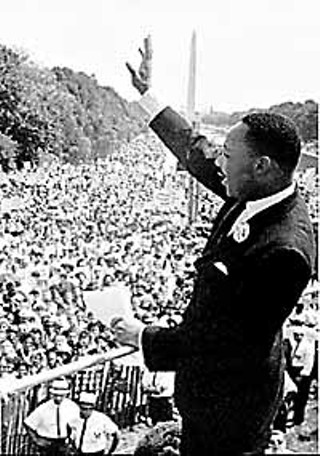Public Notice
From race riots in South Florida to the MLK Day March in Austin, "Public Notice" reflects on how far we've come and how far we've yet to go.
By Kate X Messer, Fri., Jan. 12, 2001

Pride (In the Name of Love) Mrs. Byrd used to walk Blackie every night. We could set our spanky new Christmas Timex with the real-looking thick brown leather "hippie" band to those nightly jaunts with her faithful companion. Sometimes, the increasingly frail Mr. Byrd would join the two of them for a very slow evening constitutional. But Mrs. Byrd was always the one holding the reins. She was a stately, striking woman, statuesque, really, who spoke in regal, metered tones and whose piercing black eyes danced volumes without words. Sometimes her face would crinkle into a huge grin whenever kids would make a point to stop whatever it was they were doing -- taking the Stingray with the banana seat around the block for a spin, dodging the heat-seeking precision of the treacherous Water Wiggle, or acting out fantastical and elaborate tableauxs featuring our faves from Major Matt Mason or the Partridge Family -- to run over and pet the nice lady's dog. Blackie was the icebreaker, of course, with his eager pants and wagging tail and sweet-smelling, freshly scrubbed coat, black as night, hence the name. It came as a surprise to us kids that Mrs. Byrd would remember each and everyone of us by name. She remembered our names better than a lot of the adults who lived in the neighborhood for years and years and watched us grow. Not bad for a new neighbor. Even our parents liked Mrs. Byrd; she was pleasant, articulate, and enough like them to ignore the differences, we guessed.
This was the Seventies. This was South Florida. Times were a'changin', especially in the comfy, exclusively white 'burbs. The first wave was between black and white (we won't even get into the Guatemalan, Vietnamese, or second Cuban waves). Some kids in our neighborhood were cool about it. They had already been hipped to the integration deal though extensive tours of Palm Beach County, courtesy of the school district's bright yellow buses. Some of us were confused, wondering the real reasons why some of us were transferred quickly into private schools and nobody really wanted to talk about it. And some kids eagerly followed their parents' lead and indulged in the distasteful practices of name-calling and sniggering behind people's backs, practices which displayed these families' festering roots of racial prejudice. Some of us had a hard time coming to terms with our parents' distrust and disdain for our newly integrated neighborhood. Some of us had a harder time coming to terms with our own sense of displacement, our own inner identity turmoils, and the confusion of knowing that while bigotry was wrong, most of our families were deeply entrenched in it. Loyalties were all over the place. For the most part, we, personally, scratched our heads wondering what the big deal was. So, whenever the parentals or other adult neighbors would piss and moan about "those blacks," we would get sad. Then mad. It all seemed so absurd, such a waste of energy.
The weirdest, most eerie part of the whole deal was that despite creepy jokes made by the elders about things like erecting 10-foot lead fences with machine-gun turrets (we don't make crap like this up), junkyard dogs, and barbed wire, they were wholly civil to their new neighbors. The climate of the neighborhood may have been a bit more chilly to those of us who remembered the now-nonexistent yard and block parties and chat-times outside at dusk, but the air was not of arrogance or hatred. It was more like a pervasive confusion, a not-knowing-how-to-act, exactly, a sadness and unwillingness or unreadiness to change.
This would sometime piss our little upstart selves off. We hated the subtext. We despised our parents for not trying, for not loving the way that we were taught to love in those damned pews and in that budget-straining private school with the religion class that we were made to take for all those years. Sometimes we would argue. We couldn't argue with our older sister. She had been at the local high school during the bloodiest race riot that year. That teacher was shot in cold blood. That was a scary time. We only remembered the sight of kids of all colors running in horror down the street just like all those people we had seen every night on the news on TV. A line of cops in Florida khaki followed, guns drawn, clearing the chaos like a nasty, tan squeegee. But our parents? They were bitter before that. Despite years and years working side-by-side with folks of all races in the military, despite having lived in different cultures (albeit, under the cultural imperative of the USAF), they were scared. They were full of what I thought at that tender age unthinkable: hate.
Smart-asses that we were, we kids would talk amongst ourselves about our trump card (long before we even knew what a trump card was) -- the one we had up our sleeve anytime racial arguments with the parents would ensue. When the debate would get too heated, all we had to do was utter two words. "Mrs. Byrd. What about Mrs. Byrd?" That's it, we thought, make it personal. That'll shut 'em up.
The first time we did it was the last. The look of hurt in our mother's eyes, the look of utter confusion, utter loss in our father's, chilled us enough to know we had crossed a line. Mrs. Byrd was loved in the neighborhood. She was "different."
That was the day it became clear that hatred among humans for human differences was a complex issue. There was no black and white about it. It didn't change the way we felt and it barely softened our anger, but it opened our heart to the pain and permanent damage that their hatred must have caused within. And permanent damage to a heart isn't curable with terse words and clever debate.
It occurs to us, thinking about Mrs. Byrd and the lessons she probably never knew she taught us, that there was one man whose effect was even more sublime. A man whose presence -- even if it was only on our TV screen -- drew much admiration and respect, who could stop the tide of hate, if but for seconds at a time.
This Monday, January 15, is Martin Luther King Jr. Day. Austin's 2001 MLK Community Celebration is an annual big-time deal. This year, the Austin Area Heritage Council (the people who coordinate Austin's annual MLK observance) are bringing Ossie Davis & Ruby Dee to town -- natural heirs in a lineage of fine speakers of recent years past (Maya Angelou, 1999 and James Earl Jones, 2000). The event is the following night and is sold out. The real big deal on MLK Day proper, however, is free for everyone. The MLK Day March gathers together the stripes of humanity at Huston-Tillotson, 500 Chicon, at 9am and marches to the Capitol. Parking is available at UT's Disch-Falk Field, downtown, near the Capitol, or at Huston-Tillotson. Cap Met will run free shuttles between the three locations, 7am-1pm.
Some color lines are different nowadays. Some are exactly the same. But whether the venue is faith, whom one loves, skin color, or heritage, the permanent damage to way too many hearts is still wreaking havoc and destroying lives. There's still a lot of reason to celebrate a man who could heal those divisions and whose life was taken for his trouble. www.mlkday.com or 498-4MLK.








